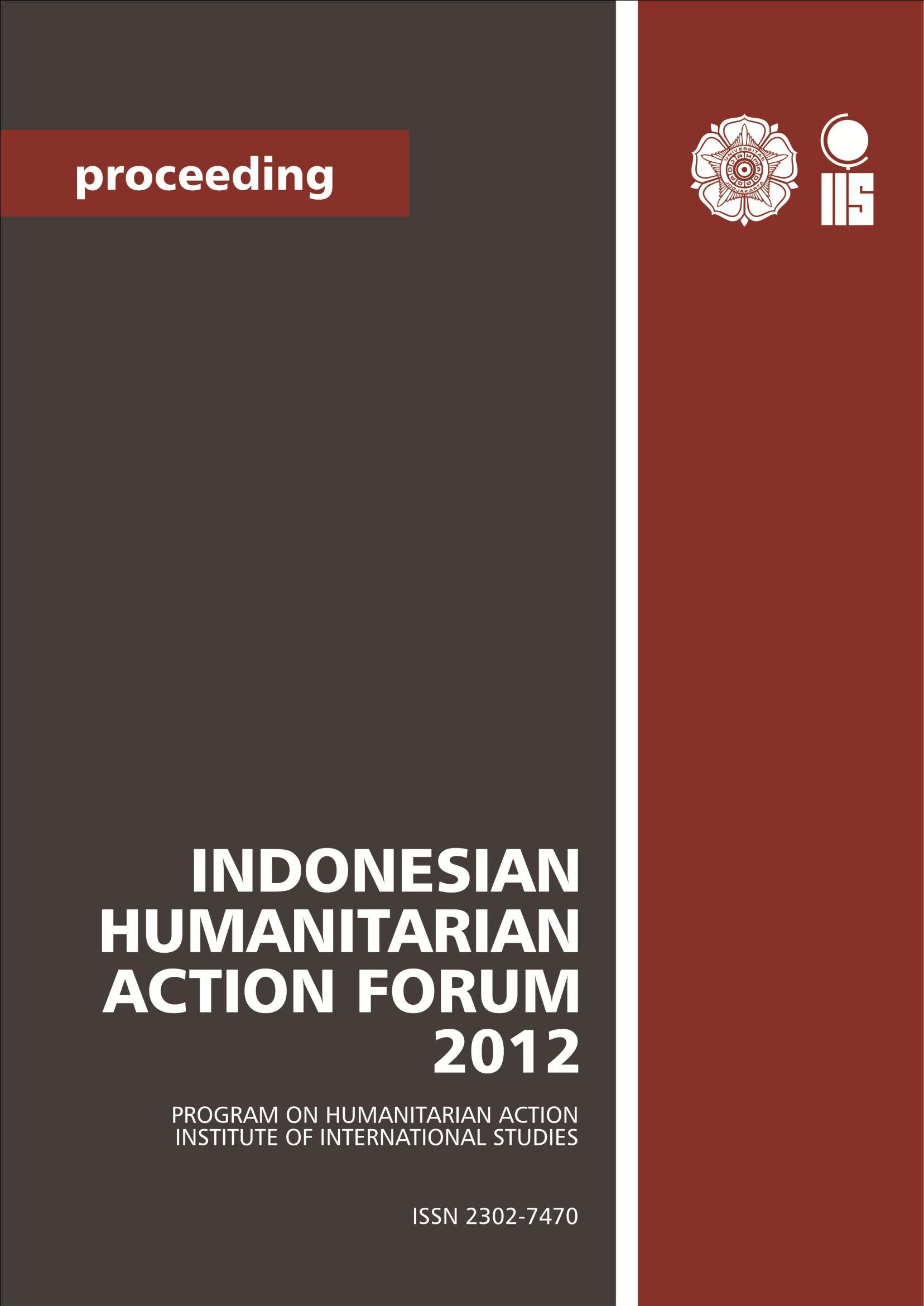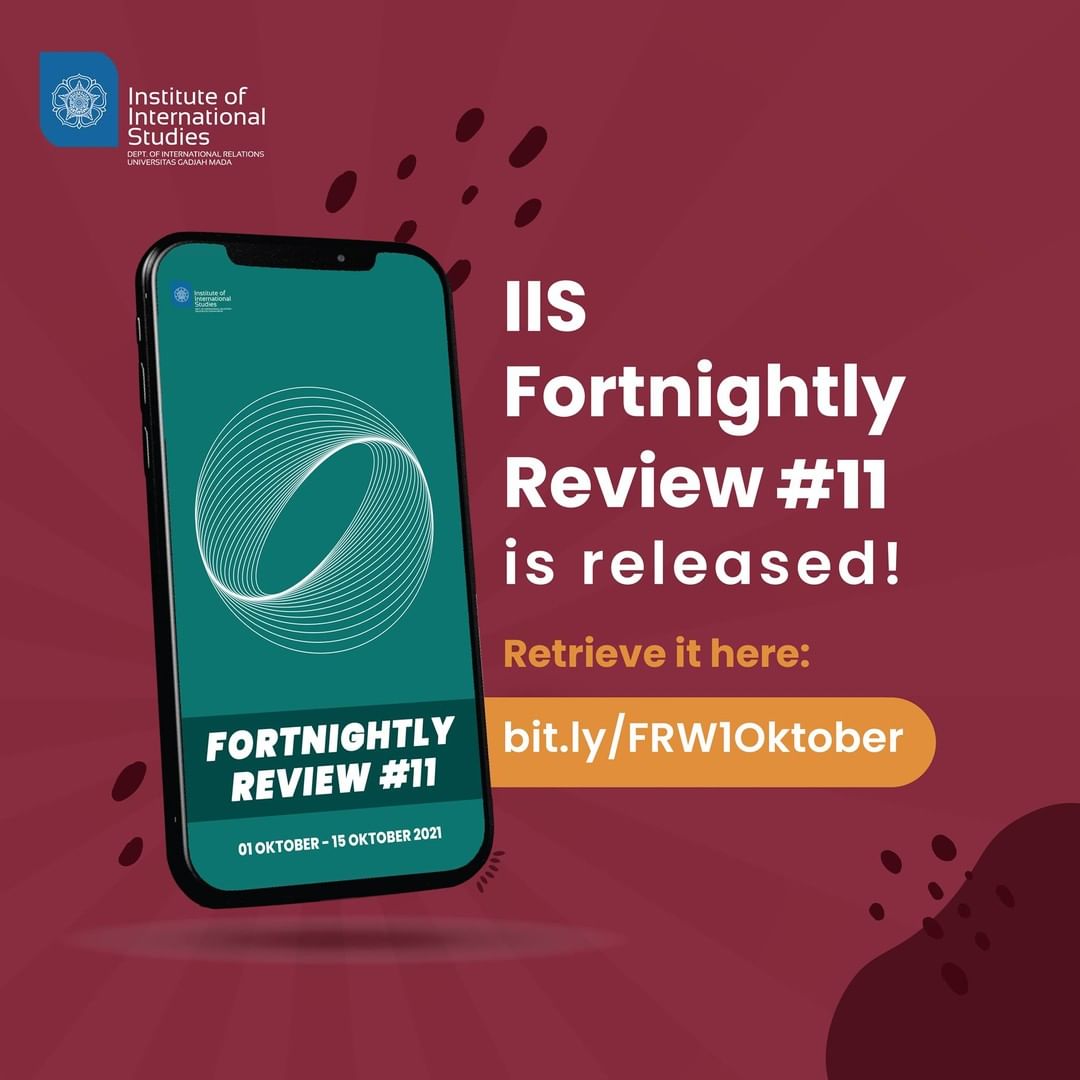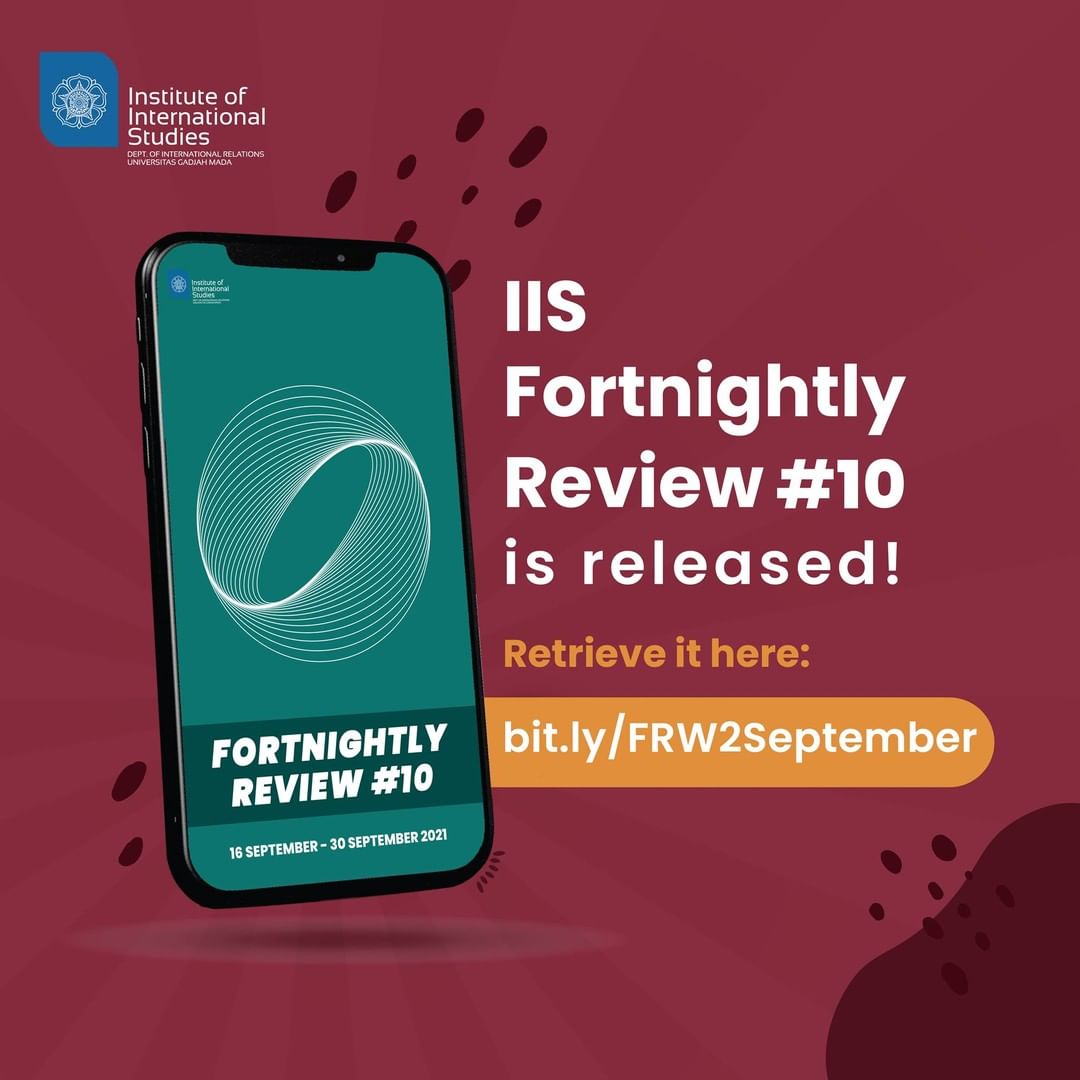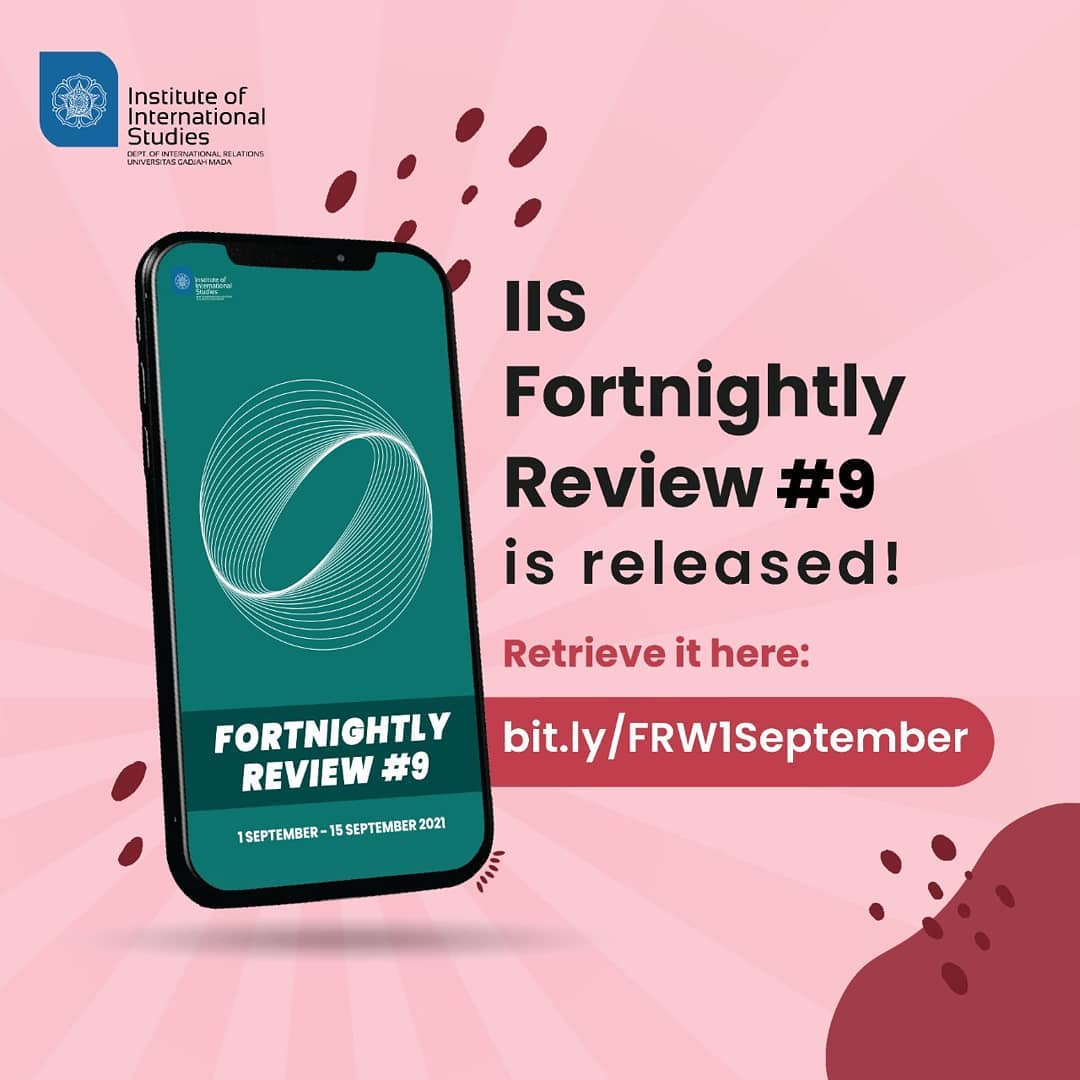Our eleventh edition of Fortnightly Review is out now! Articles featured in this edition are:
• Pioneering the Promotion of humanitarian Values in the Asia Pacific: What is Indonesia’s Agenda and Strategy? (Ica Cahayani)
• Another Look at Myanmar After the Coup (R.R. Pekerti)
• Indonesia-Malaysia’s Warning on AUKUS: A Commitment Towards a Nuclear-Free Region? (A.F. Basundoro)
Access the review through bit.ly/FRW1Oktober
Kamis (30/08) lalu, Institute of Internarnational Studies, Universitas Gadjah Mada (IIS UGM) menyelenggarakan Diskusi Cangkir Teh edisi #5 yang bertajuk “Aspek Normatif dalam Bantuan Peningkatan Kapasitas Keamanan Siber Internasional : Pengalaman Jepang dan Korea Selatan”. Dalam kesempatan kali ini, IIS UGM mengundang Azza Bimantara, alumni HI UGM yang baru saja menyelesaikan studi pascasarjana-nya di Corvinus University of Budapest. Sebagai moderator, IIS UGM menghadirkan Nabilah Nur Abiyanti, Staf Riset IIS UGM yang bertugas mendampingi Azza dalam diskusi tersebut.
Tema diskusi kali ini merupakan elaborasi dari topik tesis Azza yang berjudul “The Normative Enactment of International Cybersecurity Capacity Building Assistance: A Comparative Analysis on Japanese and South Korean Practices”. Dalam pemaparannya, Azza membahas mengenai bantuan peningkatan kapasitas keamanan siber internasional dengan mengomparasikan pengalaman kedua negara yang berbeda, yaitu Jepang dan Korea Selatan.
Pembahasan dimulai dengan pemaparan Azza tentang latar belakang dan signifikansi dari Cybersecurity Capacity Building Assistance (CCB) yang menimbulkan berbagai problematika, di antaranya ketidakmampuan untuk memanfaatkan kemajuan teknologi informasi dan kerentanan akan serangan dalam ranah dunia maya, terutama bagi negara-negara berkembang dengan tingkat penetrasi internet yang rendah,. Selanjutnya, muncul pertanyaan: bagaimana perbedaan penekanan normatif oleh negara-negara donor dapat mempengaruhi berbagai bentuk program atau proyek CCB yang dilakukan bagi negara-negara penerima? Dengan pendekatan hybrid state-centric dan international-centric, Azza memilih Jepang dan Korea Selatan sebagai sampel negara donor yang ditelitinya dalam menjawab pertanyaan tersebut.
Di satu sisi, struktur normatif kerjasama keamanan siber internasional Jepang lebih berorientasi pada aspek keamanan. Sebagai implikasinya, terbentuklah identitas dan peran Jepang dalam tata kelola keamanan siber internasional sebagai negara yang memiliki prioritas kepentingan normatif dan material yang condong ke arah aspek keamanan. Identitas dan peran tersebut termanifestasikan dalam bantuan CCB internasional yang lebih berorientasi pada aspek keamanan.
Di sisi lain, struktur kerjasama keamanan internasional Korea Selatan yang menitikberatkan pada aspek pembangunan merupakan implementasi dari reputasi positif Korea Selatan di bidang pembangunan internasional. Sebagai hasilnya, Korea Selatan lebih menekankan bantuan CCB internasionalnya dengan didasari dengan kepentingan normatif dan material yang lebih didominasi oleh aspek pembangunan serta berorientasi non-keamanan.
Sebagai penutup sesi pemaparan, Azza menyimpulkan bahwa analisis komparatif di antara Jepang dan Korea Selatan yang dikaji melalui pendekatan hybrid state-centric dan international-centric, sebagaimana tercantum pada metodologi penelitiannya, dapat menggambarkan fragmentasi norma-norma siber global, yang disebabkan oleh munculnya perbedaan proses dan persepsi oleh negara-negara di seluruh dunia.
Seusai sesi pemaparan oleh narasumber, kegiatan dilanjutkan dengan sesi diskusi yang berlangsung dengan kondusif dan dipenuhi dengan pertanyaan dari para audiens.
Penulis : Raditya Bomantara
Editor : Tim Publikasi IIS
Last Thursday (30/08), the Institute of International Studies, Gadjah Mada University (IIS UGM), successfully held the fifth edition of Diskusi Cangkir Teh entitled “Normative Aspects in International Cybersecurity Capacity Assistance: The Experiences of Japan and South Korea.” On this occasion, IIS UGM invited Azza Bimantara, an alumnus of International Relations major, Gadjah Mada University, who had just finished his postgraduate study at the Corvinus University of Budapest. Acting as the moderator, IIS UGM welcomed Nabilah Nur Abiyanti, one of the research staff at IIS UGM, to accompany Azza in the discussion.
The discussion’s theme is an extended elaboration of Azza’s thesis under the title “The Normative Enactment of International Cybersecurity Capacity Building Assistance: A Comparative Analysis on Japanese and South Korean Practices.” Accordingly, in his presentation, Azza compared the international cybersecurity capacity-building assistance of Japan and South Korea.
The discussion was kicked off by Azza’s explanation of the background and significance of Cybersecurity Capacity Building Assistance (CCB), which caused particular problems, such as the inability to benefit from the technological advances and the vulnerability of digital threats, especially for developing countries with a low internet penetration level. Furthermore, a curious question emerged: how does the disparity of normative emphasis by donor countries affect the many programs or CCB projects organized by the recipient countries? Through the hybrid state-centric and international-centric approach, Azza picked Japan and South Korea as the samples of donor countries under his scrutiny.
On the one hand, Azza found that Japan’s normative structure in terms of international cybersecurity cooperation is tilted heavily to the security aspect. As an implication, under the global cybersecurity management, Japan obtained its renowned role and identity as a donor who prioritizes normative and material interests which lend themselves to security concerns. Such position and identity manifested itself on Japan’s international CCB assistance that concerns security aspects.
On the other hand, South Korea’s international cybersecurity structure emphasizes the development aspect as an implementation of South Korea’s favourable reputation in international development. Consequently, South Korea underscored material and normative interests dominated by development aspects and non-security orientation as the foundation of her international CCB.
In his closing remarks, Azza concluded that the comparative analysis between Japan and South Korea through the lens of hybrid state-centric and international-centric approaches, as elaborated in his research methodology, enables the fragmentation of global cyber norms due to the different processes and perceptions constructed by states all over the world.
Following the presentation session by Azza, the event carried on with a productive and conducive Q&A session with the audiences.
Writer : Raditya Bomantara
Editor : Publication Team IIS
Our tenth edition of Fortnightly Review is out now! Articles featured in this edition are:
• Is Indonesia Suffering from a Decline in Academic Freedom and Freedom of Expression?: A Closer Look at the Case of Saiful Mahdi and the ITE Law (Nabilah N.A)
• Afghan Women: “They Can Not Eliminate us From the Society.” (A. Indriyosanti)
• Rethinking China’s Official Disengagement from Coal Project Funding: A New Arena for Sino-US Rivalry? (R.B.K. Sianturi)
Access the review through : https://simpan.ugm.ac.id/s/RXKmeLSsDCnZ4yK
Kamis (30/08), Institute of Internarnational Studies, Universitas Gadjah Mada (IIS UGM) menyelenggarakan Diskusi Cangkir Teh edisi #5 yang bertajuk “Aspek Normatif dalam Bantuan Peningkatan Kapasitas Keamanan Siber Internasional : Pengalaman Jepang dan Korea Selatan”. Dalam kesempatan kali ini, IIS UGM mengundang Azza Bimantara, alumni HI UGM yang baru saja menyelesaikan studi pascasarjana-nya di Corvinus University of Budapest. Sebagai moderator, IIS UGM menghadirkan Nabilah Nur Abiyanti, Staf Riset IIS UGM.
Tema diskusi hari ini merupakan elaborasi dari topik tesis Azza yang berjudul “The Normative Enactment of International Cybersecurity Capacity Building Assistance: A Comparative Analysis on Japanese and South Korean Practices”. Dalam pemaparannya, Azza membahas mengenai bantuan peningkatan kapasitas keamanan siber internasional dengan membandingkan pengalaman kedua negara yang berbeda, yaitu Jepang dan Korea Selatan.
Seusai sesi pemaparan oleh narasumber, kegiatan ditutup dengan sesi diskusi yang berlangsung dengan kondusif.
Pada Tanggal 13 s/d 15 September 2021, IIS UGM menyelenggarakan: Annual Convention on Global South 2021 yang bertemakan “International Order Beyond the Pandemic: Repositioning of the Global South” secara daring via ZOOM. Selama 2 hari berlangsungnya konferensi, peserta dapat menghadiri seminar yang diisi oleh pembicara – pembicara berkualitas dalam sesi seminar, yang kemudian dilanjutkan oleh sesi panel yang menghadirkan para presenter paper yang telah melalui proses seleksi oleh IIS UGM. Selain lewat ZOOM, rangkaian kegiatan GOSOUTH tahun ini dapat diakses lewat kanal Youtube HI UGM
Hari pertama GOSOUTH 2021 dibuka dengan sesi konferensi hari pertama yang menghadirkan Vijay Prashad dari Tricontinental : Institute of Social Research sebagai keynote speaker, yang kemudian dilanjutkan oleh sesi pemaparan oleh para pembicara. Pada sesi hari pertama, IIS UGM mengundang Hassan Wirajuda, Mantan Menteri Luar Negeri Republik Indonesia dan Christian Reus Smit dari University of Queensland untuk berbagi mengenai pandangannya tentang Global South dan pandemi global, yang kemudian dilanjutkan dengan sesi diskusi yang berjalan dengan kondusif dengan para peserta. Untuk mendamping para pembicara, pada hari pertama IIS UGM mengundang Luqman-nul Hakim dan Muhadi Sugiono dari Departemen Ilmu Hubungan Internasional, Universitas Gadjah Mada sebagai chair. Sesi hari pertama kemudian ditutup dengan diskusi panel pertama yang bertemakan “South-South Cooperation and the Reconfiguration of Geopolitics”
Hari kedua dibuka dengan diskusi panel yang membahas mengenai topik “Climate Justice and Environmental Issue in Global South” yang berlangsung sebelum sesi konferensi. Untuk sesi konferensi hari kedua, IIS UGM mengundang Rizky Alif Alvian dari Departemen Ilmu Hubungan Internasional, Universitas Gadjah Mada sebagai chair. Sesi konferensi hari kedua menghadirkan empat pembicara, yatu Utz Johann Pape dari World Bank, Diah Kusumaningrum dari Universitas Gadjah Mada, Frans Djalong dari Universitas Gadjah Mada dan Maria Tanyag dari Australian National University. Sesi pemaparan oleh keempat pembicara kemudian dilanjutkan oleh sesi diskusi yang berjalan dengan kondusif dengan para peserta konferensi, sebelum akhirnya Rizky Alif menutup sesi konferensi GOSOUTH 2021.
Hari terakhir rangkaian kegiatan GOSOUTH 2021 merupakan diskusi tiga panel berbeda yang berjalan secara simultan. Pada hari ketiga ini, para peserta dapat memilih untuk mengikuti pemaparan materi para presenter dalam panel – panel yang bertemakan “Contesting Resilience : Pandemic, Development, and Resistance”, “Theorising Global South : Representation, Moral Basis, and Realpolitik” dan “Digital Global Development : From Digital Inequality to Digital Justice”. Berakhirnya ketiga panel tersebut menandakan berakhirnya rangkaian kegiatan Annual Convention on Global South 2021 : International Order Beyond the Pandemic: Repositioning of the Global South”
Our ninth edition of Fortnightly Review is out now! Articles featured in this edition are:
• Surviving Kabul’s Dramatic Takeover: Indonesia’s Moves to Prioritize the Safety of Indonesian Citizens and Embassy Transfer (F. Tarissa)
• Listen to the Afghans: But Which Afghan? (S. Al Murtadho)
• Politicizing Revenge Porn: How Myanmar Brutalizes Women Under the Guise of Democracy (F. Tarissa)
• Is Pandemic a “Black Swan” For ASEAN E-Commerce Industries? (Arrizal A.J.)
Access the review through https://simpan.ugm.ac.id/s/SwgFNOdOQt9uB0H
Greetings Go South enthusiast!
After three days of fruitful and engaging discussions in both seminars and panel sessions, we hereby conclude the Annual Convention on the Global South 2021. We hope that all participants could gain invaluable insights through this conference that would further the interest in the studies of the Global South.
As the convener of this conference, we would like to express our deepest gratitude to partners that have supported us in organizing this event. We would also appreciate the speakers, chairs, and moderators for their contributions in this conference. Lastly, we would also thank all participants for their spirited participations throughout conference sessions.
We are looking forward to see you again in the Annual Convention on the Global South 2022!








